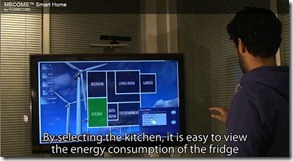The Power of Kinect for Industry
The sales for Kinect have been amazing with over 18 million sold in the past year and we were honored to receive a Guinness World Record for the fastest selling consumer electronics device ever. As consumers, we may take devices like Kinect for granted, but in fact electronic devices are the fruit of a great deal of behind-the-scenes ingenuity and experimentation. Kinect is a shining example of this.  Instead of mimicking the handheld motion-sensing controllers already on the market, we shattered the existing controller paradigm by inventing a new natural user interface system that enables advanced human tracking, gesture recognition, voice control and more. Our answer to the “wand” controller was no controller at all, or as we say, “YOU are the controller.”
Instead of mimicking the handheld motion-sensing controllers already on the market, we shattered the existing controller paradigm by inventing a new natural user interface system that enables advanced human tracking, gesture recognition, voice control and more. Our answer to the “wand” controller was no controller at all, or as we say, “YOU are the controller.”
Back in February we released the Power of Kinect for Windows. Kinect for Windows will enhance how data is captured and accessed within intelligent systems across many different industries.
Already we are seeing Kinect show up in healthcare, retail, manufacturing, advertising and marketing, education and even Power & Utilities! The applications and scenarios are only limited by your imagination as I like to say. A good example is a Whole Foods prototype that puts Kinect on shopping cart and follows people around the store and acts like their personal shopping assistant as it scans items as they’re placed inside the cart, marks them off the shopping list, and even checks the shopper out in the end. Pretty amazing! There’s even a Kinect compilation video demonstrating the innovation we are seeing emerge from this unique device which you can watch here.
In Power & Utilities we are seeing our partners work on Kinect prototypes. Our partner Ferranti is working on new ways for consumer s to manage energy consumption in a smart grid world. Ferranti believes that instead of introducing yet another display with information, consumers will want to use existing devices such as tablets, digital TV or game consoles to increase customer involvement. Their latest work shows a proof-of-concept where an energy portal using Kinect technology allows the customer to view his energy usage with mere gestures. You can get a look at Ferranti’s vision by going here.
s to manage energy consumption in a smart grid world. Ferranti believes that instead of introducing yet another display with information, consumers will want to use existing devices such as tablets, digital TV or game consoles to increase customer involvement. Their latest work shows a proof-of-concept where an energy portal using Kinect technology allows the customer to view his energy usage with mere gestures. You can get a look at Ferranti’s vision by going here.
Another example is from our partner Bentley who is a leading provider of software for the  lifecycle of the world’s infrastructure. Bentley has been looking at new ways for users to interact with engineering design software solutions with the goal of making them easier to use with advances in natural user interfaces. A good example of their work is a Kinect based 3D model navigation prototype running on MicroStation. Instead of using expensive touch screens for 3D model navigation why not use Kinect for windows? You can get a look at Bentley’s vision by going here.
lifecycle of the world’s infrastructure. Bentley has been looking at new ways for users to interact with engineering design software solutions with the goal of making them easier to use with advances in natural user interfaces. A good example of their work is a Kinect based 3D model navigation prototype running on MicroStation. Instead of using expensive touch screens for 3D model navigation why not use Kinect for windows? You can get a look at Bentley’s vision by going here.
With Kinect for Windows, we are investing in creating a platform that is optimized for scenarios beyond the living room and the examples above are just the tip of the iceberg. As I mentioned earlier, the applications and scenarios are only limited by your imagination. Enjoy! – Jon. C. Arnold